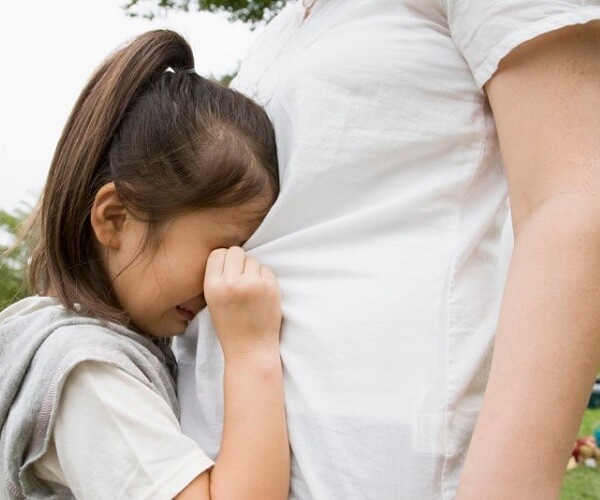Children, especially those under the age of three, do not yet have the capacity to fully understand the meaning of emotions. Emotions are a natural part of life, and expressing them is how children communicate with their surroundings.

Illustration.
When children are asked to suppress their emotions, they may feel unacknowledged. This can lead to unhealthy emotional development, making it difficult for them to identify and express their emotions later on.
Children may feel lonely, guilty, or even lack self-confidence. These feelings can persist into adulthood, affecting their relationships with others and their communication skills.
At the same time, children feel a lack of connection and empathy from their parents, leading to a distance in their relationship. This results in a lack of understanding or acceptance from parents, which then impacts their psychological development.
On this matter, psychologist Quang Thi Mong Chi provides multidimensional analyses to help parents gain the right perspective and adopt more suitable parenting methods.

Psychologist Quang Thi Mong Chi
Scenario: Parents often say, “You are not allowed to cry!” – Asking children to suppress their emotions.

What are the psychological impacts that may last from childhood into adulthood when children are frequently prevented from expressing their emotions?
When children are frequently prevented by their parents from expressing their emotions, such as being told, “You are not allowed to cry!”, it can have serious consequences that last from childhood into adulthood. Children will gradually learn to repress their emotions instead of facing them, leading to a loss of ability to recognize and name their own feelings.
When natural emotions like sadness, anger, or disappointment are considered “wrong”, children are more likely to feel ashamed or guilty whenever they experience these emotions. Over time, they may devalue themselves and feel unworthy of love or acceptance.
Additionally, being prevented from expressing emotions can cause difficulties in social relationships. Children will not know how to share or empathize with others because they have never been taught to understand and accept their own emotions.
This makes children more reserved, cautious, or even distant in their relationships, as they fear judgment or do not know how to express themselves. In other cases, children may develop “pretentious” behavior, always trying to hide their true emotions and create a perfect facade to please others. However, this hinders their ability to build honest and deep relationships.
Psychologically, constantly repressing emotions can lead to accumulated stress, increasing the risk of anxiety disorders, depression, or other psychological issues in adulthood. Children may develop unhealthy coping mechanisms, such as avoiding emotions or engaging in self-harm and substance abuse to temporarily forget negative feelings.
This also leads to a lack of emotional self-regulation skills, resulting in outbursts or loss of control when faced with pressure. When not taught how to face their emotions, children will struggle to adapt to stressful or complex situations in life.

How might the inability to express natural emotions impact a child’s perception of love and acceptance?
The inability to express natural emotions can significantly impact a child’s perception of love and acceptance from others, especially from their parents. When children are prevented from expressing their emotions, such as being told, “You are not allowed to cry!” or “Don’t make a fuss!”, they may feel that they are only loved or accepted when they meet certain emotional standards.
This sends a message to children that their emotions are unimportant or even “wrong”, leading to confusion and insecurity about their self-worth. During their development, children need confirmation that all the emotions they experience are natural and acceptable.
When parents do not acknowledge or dismiss their children’s emotions, children may start to believe that they are only worthy of love when they hide or eliminate emotions deemed negative. This weakens the emotional bond between children and their parents, making children feel unsafe in their family relationships. This sense of insecurity can lead to feelings of isolation, with children believing they have to face emotional challenges alone.
Moreover, children may develop a conditional mindset about love, thinking that they need to behave or feel a certain way to be accepted. This can cause them to lose faith in unconditional love from others. Over time, they may feel inadequate, constantly worry about rejection, or become dependent on external validation instead of having self-confidence.
On the other hand, when children are allowed to express their emotions naturally and are listened to and acknowledged by their parents, they feel loved and accepted wholly, regardless of whether they are happy, sad, or angry. This strengthens their self-confidence and builds a solid foundation for their emotional, social, and psychological development throughout their lives.

What are effective alternatives to scolding children for crying, in order to support their healthy emotional development?
Instead of scolding children for crying, parents can employ positive approaches to support their healthy emotional development. First, acknowledge your child’s emotions by listening and confirming that these feelings are entirely normal, rather than denying or dismissing them.
For example, instead of saying, “There’s no reason to cry,” parents can say, “I understand that you’re sad. Do you want to share what’s bothering you?” At the same time, guide your child to name their emotions using simple language, helping them to recognize and understand their feelings. This can be done through books, illustrated stories, or games about emotions. Providing a safe environment is also crucial, so your child feels comfortable expressing themselves without fear of judgment. When your child cries, remain calm, be present for them, and offer comfort through hugs or holding their hand to make them feel loved.
In addition to accepting emotions, parents need to teach children how to manage them. Encouraging children to draw, keep a journal, play with toys, or practice deep breathing techniques can help them release negative emotions.
Parents can also share their own experiences to show children that emotions are natural and that everyone goes through them. Once your child is calmer, work together to find solutions to problems, helping them learn to face difficulties. At the same time, assure your child that they are loved unconditionally, regardless of whether they are happy, sad, or angry, and demonstrate this through small actions like hugs and encouragement.
Setting gentle but clear boundaries is also important. Parents can explain that crying is normal, but screaming or throwing things is not acceptable. This helps children understand how to express their emotions appropriately without negatively impacting others.
Lastly, parents need to model emotion management themselves, as children learn how to handle their feelings by observing their parents. Through these approaches, children will not only learn to understand and accept their emotions but also build self-confidence and a solid foundation for healthy relationships in the future.

What are some alternative phrases that experts suggest using to help children express their emotions appropriately?
Parents can use positive phrases to help children express their emotions appropriately, making them feel understood and teaching them to manage their feelings.
When your child is sad, acknowledge their emotion by saying: “I see that you’re sad. Do you want to talk about it?” or “I understand that this makes you sad. What can we do to make you feel better?” It’s important to encourage children to express their emotions instead of repressing them with phrases like: “It’s okay to cry if you want to. Crying is a good way to release emotions,” or “Feeling sad is normal. I’m here to listen to you.”
At the same time, parents can guide children to identify and name their emotions: “Are you feeling worried, angry, or sad? Can you tell me so I can understand, too?” or “Sometimes we feel sad, and that’s okay. Do you want to tell me what happened?”
When children feel comforted and empathized with, phrases like: “I’ve felt the same way before. Let’s get through this together,” or “It’s understandable that you’re sad. Sometimes we all feel sad, and that’s normal,” will help them feel loved and secure.
Additionally, parents can teach children healthy ways to cope with their emotions: “When you’re sad, you can take deep breaths and talk about your feelings. I’m here to help you,” or “If you’re angry, try clenching and unclenching your fists or drawing something to make you feel better.”
Encouraging phrases like: “You don’t have to hold back your emotions. Go ahead and express them, and we’ll work it out together,” or “What can we do to make you feel better? Do you have any ideas?” will boost their confidence in facing their emotions. Through understanding, companionship, and positive guidance from their parents, children can learn to manage their emotions and build a solid foundation for healthy emotional development.
The Power of Friendship: Nurturing Healthy Social Skills in Children
Introducing our latest infographic: “Nurturing Healthy Friendship Skills in Children: Building a Supportive Network”. In today’s complex social landscape, it is crucial to equip our children with the tools they need to foster meaningful connections and build a strong support system. Our visual guide delves into the importance of teaching kids how to navigate friendships and cultivate positive relationships that can accompany them throughout their lives, ensuring they always have a helping hand wherever they go.





































